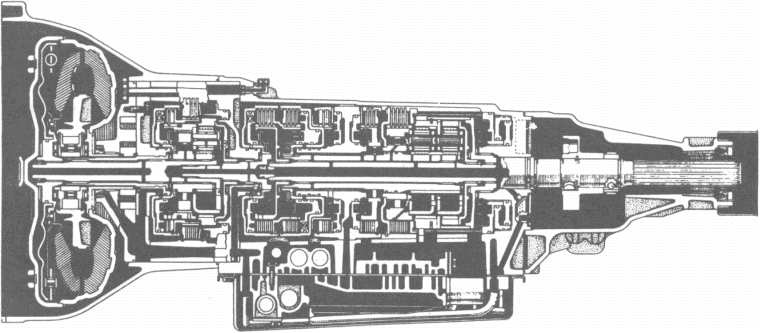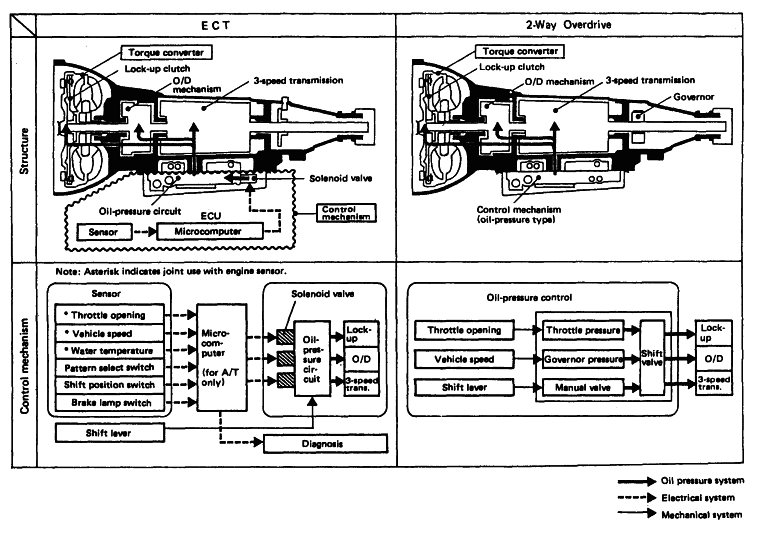Aug. 20, 1981
TOYOTA INTRODUCES WORLD'S FIRST MICROCOMPUTER
CONTROLLED AUTOMATIC TRANSMISSION ECT
Toyota announced that it has developed and made available commercially a new micro-computer-based automatic transmission ECT (Electronic Controlled Transmission). This system is being offered in some models of Toyota's luxury saloon, the New Crown, introduced today with minor changes.
ECT uses a microcomputer to add new dimensions of precision and flexibility to the gear-changing and lock-up functions of the 4-speed automatic transmission with 2-way overdrive. This transmission, the first of its kind ever, provides major improvements in fuel efficiency and other aspects of performance.
Toyota has long been in the forefront of the world's automakers in developing quiet, highly fuel-efficient automatic transmissions: for example, it developed the 4-speed automatic transmission with overdrive introduced in 1977, and the 4-speed automatic transmission with 2-way overdrive introduced in 1980.
Figure 1―ECT Cross-Section

ECT's Control System
ECT is composed of a torque converter with lock-up clutch, a gearbox and a control mechanism. In the ECT a microcomputer replaces the oil pressure control mechanism and uses electronic sensors to monitor speed, throttle opening, engine water temperature, gear shifting patterns and brake signals (see Figure 2). The Electronic Control Unit (ECU) computes optimal points for gear changes and locking up the clutch, then outputs signals to the solenoid valves. The solenoid valves operate the actuators for the gear shifting and lock-up, and the ECT's self-diagnosis function monitors malfunctions in the sensors and the electrical system.
Figure 2―ECT and 2-Way Overdrive Control Systems

Special features of ECT
- Better fuel efficiencyThe use of a microcomputer enhances the precision and flexibility of gear changes and permits expansion of the lock-up range in second and third gears and overdrive, resulting in significant improvements in fuel efficiency.
- Improved shifting qualityA microcomputer controls precisely the timing between gear shifting and operation of the lock-up clutch, and ensures that the line pressure is optimal for the engine torque characteristics, a feature that reduces the type of jolt commonly accompanying the shifting of gears.
- Improved driveabilityFine-tuned control and optimization of the lock-up clutch's operation, accomplished by monitoring closely factors such as throttle opening, vehicle speed, engine water temperature and the gear ratio, contributes to improved driveability in such ways as reducing noise and vibrations.
- Self-diagnosis functionThe ECT has a self-diagnosis function for automatically detecting abnormalities in the sensors, the electrical system and other places.
ECT An automatic transmission with three roles
- The Normal Pattern is appropriate for almost all driving situations in the city, on expressways or in the suburbs. This pattern is automatically in operation when neither of the alternate driving pattern select buttons is depressed.
- The Economy Pattern allows more fuel-efficient driving by increasing the operational range of the lock-up clutch. The driver presses the Economy button for this pattern.
- The Power Pattern places the engine's full power capabilities at the driver's disposal for driving on mountain roads, for example, or when the driver wants to use the engine brake more effectively. The driver presses the Power button for this pattern.
For the time being, the Electronic Controlled Transmission will be for the domestic market only, available for the Crown Royal Saloon with 5M-GEU Type engine (2.8 L, 6- cylinder, double-overhead camshaft).




